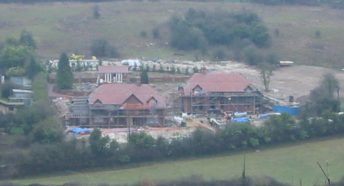CPRE Hampshire on calculating housing numbers and another ‘dodgy algorithm’
Members of CPRE Hampshire’s Planning and Policy Group are leading the charity’s responses to the Government’s Planning for the Future White Paper and the Changes to the Current Planning System consultation paper and how they might affect Hampshire.
CPRE introductory context
CPRE believes that planning is crucial to empowering local communities and making sustainable, liveable places. Ensuring everyone has a decent home, that meets their needs and that they can afford, is essential to that, both in town and country. Equally, it is vital that new development is planned intelligently; our countryside is precious and fragile and urgently needs better management in the face of the climate and nature emergencies. Critical to this is that land is not lost to development unnecessarily. More new homes are needed and there is plenty of scope to use previously developed urban land to help address this need. CPRE’s national and local responses to the Government’s planning consultations concentrate on assessing how the CPRE network believes the proposals will help or hinder these objectives.
Members of CPRE Hampshire’s Planning and Policy Group are leading the charity’s responses to the Government’s Planning for the Future White Paper and the Changes to the Current Planning System consultation paper and how they might affect Hampshire.
The proposed reforms represent the biggest change to the planning system since the Town and Country Planning Act in 1947. CPRE Hampshire is part of the CPRE network which has concerns about these proposals, particularly on how they would reduce local democracy, lead to the unnecessary loss of more countryside to development, fewer affordable homes in rural areas while failing to ensure homes are built to zero carbon standards.
CPRE Hampshire is now finalising its response to the Changes to the Current Planning System consultation which closes on 1st October 2020.
Caroline Dibden, Vice President of CPRE Hampshire says, ‘The single biggest issue facing Hampshire in the consultation paper ‘Changes to the Current Planning System’ is the method of calculating housing numbers. The Government proposes to distribute 337,000 new homes annually across England, using a standard method. It allocates 9,275 new homes every year to Hampshire, although the Office for National Statistics projects only 4,097 new households will be formed.
The formula is a blunt tool, which starts from the premise that increasing supply of new homes increases affordability. We, and a number of experts disagree with that premise. Government should withdraw the proposal.
The proposed new formula is another ‘dodgy algorithm’ which serves mainly to shift housing numbers from the cities to the rural districts. For example, in Hampshire – East Hampshire numbers would rise from current ones by 50%, Winchester by 48%, Test Valley by 40% whilst Southampton is down by 17%, Portsmouth by 15%. Havant and Hayling Island rises by a whopping 91%.’
CPRE Hampshire has produced a summary for its members and the public in response to the planning reforms: CPRE Hampshire Summary on Changes to the Current Planning System. It outlines the charity’s position on calculating housing numbers and why new housing cannot be distributed via a simplistic algorithm with no strategy. CPRE Hampshire highlights ten concerns:
- Rural areas will bear the brunt
- Young people will still be on the housing waiting list
- Higher new housing target whilst population growth is actually slowing
- No account is taken of environmental constraints (e.g. National Parks, water resources, designated landscapes)
- It doesn’t deliver more affordable homes, but rather more expensive “executive boxes”
- It doesn’t take account of the fact that one million homes, for which planning permission has already been given, have not yet been built
- Unlevel playing field – too much development and investment is focussed on London and the South East
- Greenfield at risk – the objective of maximising use of brownfield land is not achieved with these proposals and is not good for the Climate Emergency
- Removal of local decision-making
- One size cannot fit all – each region and each district have different constraints and different growth factors
Caroline Dibden adds, ‘We think that an alternative to the proposals is to start by looking at the most recent ONS population growth statistics and household formation rates for each area. After that, each authority should look at past delivery, affordable need, social housing, empty homes/second homes/student populations, employment levels and commuting patterns, and last, but definitely not least, environmental and other constraints on growth.’
CPRE Hampshire wrote to all Hampshire MPs at the beginning of September about the Government’s proposed planning reforms. Nationally, CPRE has formed a petition to stop the government deregulate planning which to date has attracted over 36,700 signatures.
CPRE Hampshire will be sending its responses to the Changes to the Current Planning System and Planning for the Future consultations direct to the Government and is feeding into CPRE’s national responses. Its response to Changes to the Current Planning System is available here: CPRE Hampshire Response to Changes to the Current Planning System. Its response to Planning for the Future will also be available from the website. It wants its membership and members of the public to submit their own responses to the consultations and/or to write to their local MP. CPRE Hampshire’s summary paper and letter to Hampshire MPs, which can be used as a template to help with individual responses, is available here. Find your MP’s details at www.theyworkforyou.com.
To help CPRE Hampshire campaign for a planning system that benefits people and the countryside, join as a member or sign up for our regular newsletter on countryside issues: visit www.cprehampshire.org.uk.








